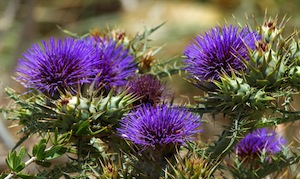- Milk thistle is a plant. The above ground parts and seeds are used to make medicine. The seeds are more commonly used.
- Milk thistle gets its name from the milky sap that comes out of the leaves when they are broken. The leaves also have unique white markings that, according to legend, were the Virgin Mary’s milk. Don’t confuse milk thistle with blessed thistle (Cnicus benedictus).
Contents
Uses
- Milk thistle is used most often for liver disorders, including liver damage caused by chemicals, Amanita phalloides mushroom poisoning, jaundice, chronic inflammatory liver disease, cirrhosis of the liver, and chronic hepatitis.
- Loss of appetite
- Heartburn (dyspepsia)
- Gallbladder complaints.
- Diabetes
- Hangover
- Diseases of the spleen
- Prostate cancer
- Malaria
- Depression
- Uterine complaints
- Increasing breast milk flow
- Allergy symptoms
- Starting menstrual flow.
- In foods, milk thistle leaves and flowers are eaten as a vegetable for salads and a substitute for spinach.
- The seeds are roasted for use as a coffee substitute.
Benefits
- Milk thistle seed might protect liver cells from toxic chemicals and drugs. It also seems to have antioxidant and anti-inflammatory effects. Milk thistle plant extract might enhance the effects of estrogen.
Cautions
- Special Precautions & Warnings:
Pregnancy and breast-feeding: Not enough is known about the use of milk thistle during pregnancy and breast-feeding. Stay on the safe side and avoid use.
- Allergy to ragweed and related plants: Milk thistle may cause an allergic reaction in people who are sensitive to the Asteraceae/Compositae plant family. Members of this family include ragweed, chrysanthemums, marigolds, daisies, and many others. If you have allergies, be sure to check with your healthcare provider before taking milk thistle.
- Diabetes: Certain chemicals in milk thistle might lower blood sugar in people with diabetes. Dosing adjustments to diabetes medications might be necessary.
- Hormone-sensitive conditions such as breast cancer, uterine cancer, ovarian cancer, endometriosis, or uterine fibroids: Extracts from milk thistle PLANT might act like estrogen. If you have any condition that might be made worse by exposure to estrogen, don’t use these extracts. In contrast, the more commonly used milk thistle SEED extracts do not seem to act like estrogen.
Interactions
Moderate Interaction Be cautious with this combination
- Medications changed by the liver (Cytochrome P450 2C9 (CYP2C9) substrates) interacts with MILK THISTL:.
- Some medications are changed and broken down by the liver. Milk thistle might decrease how quickly the liver breaks down some medications. Taking milk thistle along with some medications that are broken down by the liver can increase the effects and side effects of some medications. Before taking milk thistle talk to your healthcare provider if you take any medications that are changed by the liver.
Some medications that are changed by the liver include amitriptyline (Elavil), diazepam (Valium), zileuton (Zyflo), celecoxib (Celebrex), diclofenac (Voltaren), fluvastatin (Lescol), glipizide (Glucotrol), ibuprofen (Advil, Motrin), irbesartan (Avapro), losartan (Cozaar), phenytoin (Dilantin), piroxicam (Feldene), tamoxifen (Nolvadex), tolbutamide (Tolinase), torsemide (Demadex), warfarin (Coumadin), and others.
Medications changed by the liver (Glucuronidated Drugs) interacts with MILK THISTLE:
- The body breaks down some medications to get rid of them. The liver helps break down these medications. Taking milk thistle might affect how well the liver breaks down drugs. This could increase or decrease how well some of these medications work.
Some of these medications changed by the liver include acetaminophen, atorvastatin (Lipitor), diazepam (Valium), digoxin, entacapone (Comtan), estrogen, irinotecan (Camptosar), lamotrigine (Lamictal), lorazepam (Ativan), lovastatin (Mevacor), meprobamate, morphine, oxazepam (Serax), and others.
Minor Interaction Be watchful with this combination
Estrogens interacts with MILK THISTLE:
- Milk thistle might decrease hormones in the body. Milk thistle might help the body break down estrogen pills to get rid of them. Taking milk thistle along with estrogens might decrease the effectiveness of estrogen pills.
Milk thistle contains a chemical called silymarin. Silymarin might be the part of milk thistle that helps the body break down estrogens.
Some estrogen pills include conjugated equine estrogens (Premarin), ethinyl estradiol, estradiol, and others.
Medications used for lowering cholesterol (Statins) interacts with MILK THISTLE:
- Theoretically, milk thistle might change the levels of some medications used for lowering cholesterol (statins). This could increase or decrease how well these medications work.
Some medications used for lowering cholesterol include atorvastatin (Lipitor), fluvastatin (Lescol), lovastatin (Mevacor), pravastatin (Pravachol), and rosuvastatin (Crestor).
Other Names
Artichaut Sauvage, Blessed Milk Thistle, Cardo Lechoso, Cardui Mariae Fructus, Cardui Mariae Herba, Carduus Marianum, Carduus marianus, Chardon Argenté, Chardon de Marie, Chardon de Notre-Dame, Chardon Marbré, Chardon-Marie, Épine Blanche, Holy Thistle, Lady’s Thistle, Lait de Notre-Dame, Legalon, Marian Thistle, Mariendistel, Mary Thistle, Our Lady’s Thistle, Shui Fei Ji, Silibinin, Silybe de Marie, Silybin, Silybum, Silybum marianum, Silymarin, Silymarine, St. Mary Thistle, St. Marys Thistle.
References
Source: WebMD, “Milk Thistle”, www.webmd.com/vitamins-supplements/


Pingback: Template | NutraWiki